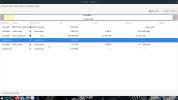I checked on all of my Debian partitions and I can't tell if there are too many kernels or what.
When I did a fresh installation of Debian 12 I gave 300 MiB's for the boot partition. That's what was recommended in the Debian documentation.
The current kernel installed is:
Would deleting old kernels be the best practice?
When I did a fresh installation of Debian 12 I gave 300 MiB's for the boot partition. That's what was recommended in the Debian documentation.
Code:
debian-box:~$ dpkg -l | grep linux-image-
ii linux-image-6.1.0-13-amd64 6.1.55-1 amd64 Linux 6.1 for 64-bit PCs (signed)
ii linux-image-6.1.0-15-amd64 6.1.66-1 amd64 Linux 6.1 for 64-bit PCs (signed)
ii linux-image-6.1.0-16-amd64 6.1.67-1 amd64 Linux 6.1 for 64-bit PCs (signed)
ii linux-image-amd64 6.1.67-1 amd64 Linux for 64-bit PCs (meta-package)
debian-box:~$ df -h
Filesystem Size Used Avail Use% Mounted on
udev 7.8G 0 7.8G 0% /dev
tmpfs 1.6G 1.7M 1.6G 1% /run
/dev/sdb1 77G 14G 59G 20% /
tmpfs 7.8G 0 7.8G 0% /dev/shm
tmpfs 5.0M 12K 5.0M 1% /run/lock
/dev/sdb3 300M 300M 0 100% /boot
/dev/sdb2 480G 12G 444G 3% /home
tmpfs 1.6G 104K 1.6G 1% /run/user/1000The current kernel installed is:
Code:
6.1.0-15-amd64Would deleting old kernels be the best practice?


